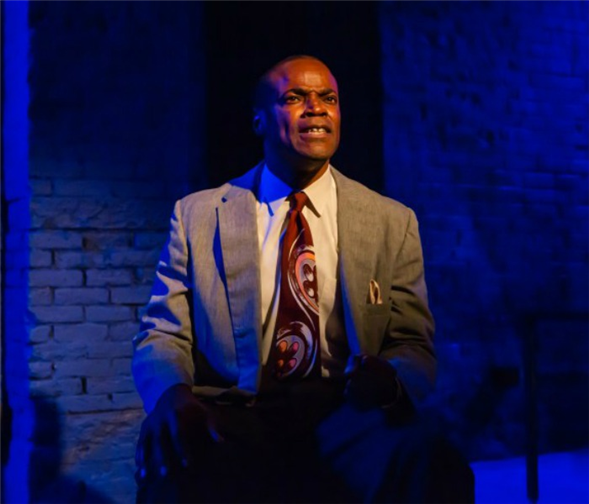Translate Page

Jewelle Gomez's new play examines the writer's dueling identities
---
What do you do when what's oppressing you also nurtures and sustains you? In Waiting for Giovanni, playwright Jewelle Gomez examines James Baldwin's complicated relationship with the burgeoning civil rights movement while penning his 1956 novel Giovanni's Room. Though now considered a classic, the book was the height of taboo in its time due to its exploration of homosexual love, and some of Baldwin's peers worried he might alienate his readership. Presented by LGBTQ theatre company TOSOS at the Flea, Waiting for Giovanni delves into the love and anguish that shepherded Baldwin's masterpiece to publication.
Like Baldwin was in his day, the 69-year-old Gomez is a novelist, dramatist and activist. She spent years researching and refining Baldwin's voice for Waiting for Giovanni, and it's so convincing, some audiences have assumed she incorporated his journals or published words into her text. (She did not.) "I take that as a compliment," says Gomez. "I immersed myself so much that when I started to write, I invoked him enough that it felt comfortable."
Gomez embarked on Waiting for Giovanni when her friend, Harry Waters Jr., asked if she could write a piece about Baldwin for him to perform. What started out as a monologue evolved, through a collaboration with Waters, into a full-length play, which he directed in its world premiere at San Francisco's New Conservatory Theatre Center in 2011.
"Harry set me on this wonderful odyssey of reading everything I could get my hands on that Baldwin wrote or that was written about him so I could try to capture who he was," says Gomez. "What were his desires, his needs? What made him who he was and how did I relate to that as a queer woman of color?"
In the play, Baldwin (Jonathan Dewberry) wrestles with whether to release Giovanni's Room or hide it away. He talks with his detractors (his dad's ghost and Native Son author Richard Wright) and his supporters (Raisin in the Sun playwright Lorraine Hansberry and Baldwin's French lover Luc). Yet he worries releasing such a book will be tantamount to career suicide.
Through a friend, Gomez met a former editor who had worked with Baldwin. "He started talking about Giovanni's Room and how much crap people had given Baldwin about it," she says. "They told him a book about two white men in Paris was not where he should go next and he felt hurt. And then click! I thought, that is just what happened to me when I started writing The Gilda Stories [about the experiences of a black bisexual female vampire]. I had people tell me, 'Why would you want to connect something as negative as vampires with African-American people?' That really gave me a way to get into the play."
While audiences know going in what Baldwin ultimately decided to do with his manuscript, Waiting for Giovanni isn't so much about the making of the book but of how Baldwin forged his own intersectional identity a half century before that concept even existed. For Gomez, who also identifies as a gay person of color, writing the play was a cathartic experience. "Although I'd read his stuff, suddenly I got the subtext of everything about his life and the world that he lived in that helped to make him who he was," she says. "It made me fall in love with him and want to make him live again."
---
A dancer and playwright, Juan Michael Porter II has contributed articles to Ballet Review, The Dance Enthusiast, Time Out New York, Broadway World and HuffPost. Follow him at @juanmichaelii. Follow TDF at @ TDFNYC.
Top image: Jonathan Dewberry in Waiting for Giovanni. Photos by Mikiodo.
TDF MEMBERS: Go here to browse our latest discounts for dance, theatre, and concerts.